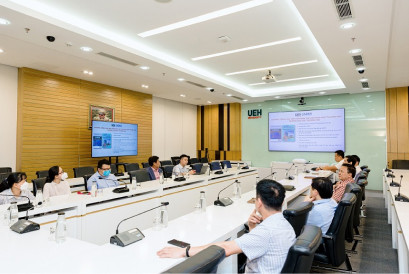Thông báo tuyển sinh thạc sỹ quản trị kinh doanh MBA (Tiếng Anh)
CHƯƠNG TRÌNH THẠC SỸ QUẢN TRỊ KINH DOANH - MBA
LIÊN KẾT GIỮA ĐẠI HỌC KHOA HỌC ỨNG DỤNG IMC KREMS - CỘNG HOÀ ÁO VÀ ĐẠI HỌC THƯƠNG MẠI
Chương trình: Thạc sỹ Quản trị kinh doanh (tên tiếng Anh: Master Program in Business Administration)
Giới thiệu đối tác: Trường Đại học Khoa học Ứng dụng Krems là một trường đại học nổi tiếng thế giới với hơn 1.800 sinh viên từ khắp nơi trên thế giới. Quốc tế hóa và ứng dụng thực tế là những ưu tiên hàng đầu của tất cả các chương trình đào tạo tại Đại học Khoa học Ứng dụng Krems.
Chương trình MBA là chương trình đào tạo phi lợi nhuận được triển khai giữa Bộ Giáo dục và Đào tạo Việt nam và Bộ giáo dục cộng hoà Áo và đã được Bộ Giáo dục và đào tạo Việt Nam cấp phép.
Website: http://www.fh-krems.ac.at
Thời gian đào tạo: 12 tháng. Các lớp học được sắp xếp phù hợp với người đi làm, học vào buổi tối các ngày trong tuần và ban ngày các ngày thứ bảy, chủ nhật. Học và thi theo hình thức cuốn chiếu.
Bằng cấp: Do Đại học Khoa học ứng dụng (Cộng hoà Áo) cấp có giá trị tương tự tại trụ sở chính của trường Đại học Khoa học ứng dụng, Cộng hoà Áo.
Chương trình đã được Bộ giáo dục và đào tạo Việt Nam cấp giấy phép.
Học phí: Khoảng 135 triệu đồng (tương đương 6.500 usd)/học viên/ khoá
Địa điểm học: trường Đại học Thương Mại, Cầu Giấy, Hà Nội
Ngôn ngữ đào tạo: Giảng dạy, kiểm tra, thi, nghiên cứu tài liệu tham khảo sử dụng tiếng Anh đối với các môn học do giáo viên nước ngoài dạy. Luận văn được viết bằng tiếng Anh (Mỗi môn học do giáo viên nước ngoài dạy sẽ có trợ lý sư phạm của Đại học Thương mại hướng dẫn)
Đội ngũ giảng viên: Giảng viên của chương trình được kết hợp giữa các giảng viên của trường Đại học Khoa học ứng dụng (Cộng hoà Áo) cử sang và các giảng viên có kinh nghiệm của Đại học Thương Mại đã được Đại học Khoa học ứng dụng chấp nhận.
Hình thức xét tuyển : Chương trình xét tuyển hồ sơ và phỏng vấn trực tiếp.
Đối tượng tuyển sinh: Đã tốt nghiệp đại học hoặc chuẩn bị tốt nghiệp áp dụng cho mọi chuyên ngành
Lợi ích của chương trình:
- Học trong môi trường đào tạo chất lượng cao theo công nghệ và tiêu chuẩn của Cộng hoà Áo, cung cấp cho học viên kiến thức và bằng cấp giống như cấp cho học viên đi du học tại Cộng hoà Áo, với chi phí thấp hơn nhiều. Chương trình giúp học viên có cơ hội được tiếp cận với hệ thống giáo dục tiên tiến của Cộng hoà Áo mà không cần đi du học.
- Chương trình xen lẫn giữa lý thuyết và thực hành, giúp học viên có kiến thức chuyên môn và kỹ năng thực hành.
- Chương trình được dạy và học bằng tiếng Anh; nhờ thế sau khi tốt nghiệp kỹ năng ngoại ngữ của học viên (bao gồm kỹ năng giao tiếp và học thuật) được tăng cao đáng kể.
- Chương trình có hỗ trợ trợ giảng nhằm giúp học viên ôn tập, hệ thống lại kiến thức sau mỗi môn học; từ đó học viên có cơ hội nắm kiến thức vững hơn.
- Chương trình được thiết kế tạo cơ hội cho những người đang làm việc theo học. Các giờ lên lớp nghe giảng để sắp xếp vào các buổi tối (từ 18h30 đến 21h00) và ban ngày ngày Thứ 7, Chủ nhật.
CHƯƠNG TRÌNH ĐÀO TẠO MBA - KREMS
TT | Tên môn học | TT | Tên môn học |
1 | {tooltip}Strategic Management{end-texte}Strategic management concepts, strategic management in a company environment, company culture, company policy as well as operational levels as part of strategic management, analysis of initial strategic position, positioning strategic business units, selecting strategic skill structure in the company, creation of relative competitive advantages, measuring the success of strategies.{end-tooltip} | 7 | {tooltip}Coporate Finance{end-texte}Characteristics of structured financing, project financing, application fields and participatory project finance, procedure, project risks and their division, building blocks of project financing, acquisition financing: leveraged buyout, success factors, structure and structuring, private equity, senior debt, mezzanine capital, high-yield bonds,procedure, securitization of company receivables (asset backed securities), participants, structure and objectives, risks, requirements for asset backed securities, procedure for financing using asset backed securities, the commercial paper market{end-tooltip} |
2 | {tooltip}Multi-project management{end-texte}Principle of multi-project management, multi-project management as part of strategic planning, responsibility in the planning process, tasks and roles in multi-project management, prioritizing projects, planning process in multi-project management, risk management in multi-project management, resource management, directing project portfolios, project portfolio management, inter-project information management, software for multi-project management, multi-project management controlling.{end-tooltip} | 8 | {tooltip}Due diligence{end-texte}Principles of corporate valuation, reasons for valuation, objective/ objectified/ subjective corporate valuation, value versus price, valuation concepts, individual valuation procedures, total valuation procedure, mixed procedures, revenue value procedure (concept, equivalence principle, two-phase model, discount rate), discounted cash flow procedure (concept, gross settlement, net settlement, APV procedure, determining the cost of equity, WACC, alternative determination of cost of capital rates), special topics and questions regarding company valuation, selection of valuation methods, possibilities for reducing false decisions when acquiring a company and during take over of companies, phases in the execution of due diligence, dimensions of due diligence, commercial due diligence, environmental due diligence, legal due diligence, fiscal due diligence, due diligence review, interpreting due diligence findings, conclusions regarding the earnings power of the company, earning power of the company and determining purchase price, setting purchase prices in practice{end-tooltip} |
3 | {tooltip}Strategic Controlling{end-texte}Principles and concepts of strategic controlling, tasks in strategic controlling, strategic controlling instruments, critical success factors in the designing of strategic controlling systems, implementation of strategic controlling systems in companies, strategic early information, IT support as part of strategic controlling.{end-tooltip} | 9 | {tooltip}Merges and Acquisitions{end-texte}Management buyout, management buy in, leveraged buyout, acquisition (stock acquisition, asset-acquisition), strategies for company purchases, the process of purchasing a company, asset deal, share deal, re-establishment, tax avoidance in company purchases and mergers, setting purchases price (fixed acquisition price versus variable acquisition price), payment methods, financing company acquisitions, success factors for the merger or acquisitions of a company, integrating the acquired company into a pre-existing company structure, working through case studies; complete review of all the matter in the course of study.{end-tooltip} |
4 | {tooltip}International Marketing{end-texte} Issues impacting international and global marketing are analyzed using interdisciplinary case studies. Students shall develop solutions using case studies and then they will present their solutions. The case studies will place a special focus on areas such as intercultural marketing management, international e-marketing, and innovative marketing strategies in global competition or global e-marketing.{end-tooltip} | 10 | {tooltip}Interactive Leader Training{end-texte}Social function of the manager, value orientation, integrity, permanent personal development, forcing targeted changes, re-teaming, solution oriented tools for organizational development, strategy types and their significance regarding management behavior, organizational, social and personnel resources.{end-tooltip} |
5 | {tooltip}Accounting{end-texte}Principles of consolidated financial statements, mandatory entries when creating a consolidated financial statement, consolidation methods (complete consolidation, pooling of interest method, proportional consolidation, equity method), difference between IAS/ IFRS and the Austrian Commercial Code, creating a consolidated financial statement, consolidated balance sheet, consolidated income statement, cash flow statement, statement of shareholder equity, sector reporting, management report, connection between consolidated statements and individual statements.{end-tooltip} | 11 | {tooltip}Financial Analysis{end-texte}Managers learn how to increase company value, to evaluate capital investment proposal, to measure management performance, to use cash flow analysis, to interpret and evaluate financial information.{end-tooltip} |
6 | {tooltip}Managing of/in Crisis Situation{end-texte}Company crises, early warning systems for company crises, recognition of company crises, possible courses of action in crisis situations, measures for dealing with crises, restructuring companies, reorganization measures, financing reorganization measures, monitoring reorganization.{end-tooltip} | 12 | {tooltip}Research Seminar{end-texte}Application of scientific theoretical principals as well as the rules governing scientific papers, independent work on a limited subject in the area of business management using the scientific methods available, writing a seminar paper about a limited subject areas derived from research projects or from areas of interest to the course of study, presenting and discussing the core areas of the seminar paper{end-tooltip} |
Hạn nộp hồ sơ: Ngày 15/04/2012 (Đợt 1) và 10/9/2012 (Đợt 2) .
Mẫu đơn đăng ký: Download tại đây
Mọi chi tiết xin liên hệ với khoa Đào tạo quốc tế - phòng D104, Trường Đại học Thương mại. Điện thoại: 04.37687739








